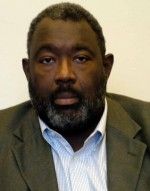Faculty Profile: Phillip Richards

“I learned a lot about France during my year-long stay at L’Universite?e Stendhal, the arts and science college of the University of Grenoble,” Associate Professor of English Phillip Richards said. “Stendahl was a very cosmopolitan university whose students came not only from France, but also from countries throughout Europe, Asia and Africa. Teaching in France, Africa and throughout the United States, Richards has encountered university education from many perspectives. As a Professor of English in francophone (French-speaking) universities in Africa (L’Universit?e Omar Bongo in Gabon) as well as in France, Richards saw the competitive atmosphere many students outside of the United States faced. “At L’Universit?e Stendhal, nearly 50 per cent of any year’s cohort of prospective English students failed during their first two years,” Richards said. “I saw much the same selectiveness in Africa. The francophone university system is tough and unforgiving. One has to teach in it to appreciate thoroughly the remarkable educational opportunity available to the American public. It is sobering to see the experience endured by the rest of the world, as it attempts to get a college education.” Richards grew up in Cleveland, Ohio, where he attended public schools until the 11th grade. At that time, he received a scholarship to a private school, where he finished his secondary education. Richards graduated from Yale University with a Bachelors of Arts in English and later earned his Masters of Arts and PhD in English from the University of Chicago. After receiving his doctorate and joining the English Department at Colgate, Richards was a Fulbright fellow in Africa, a fellow at the National Humanities Center, a scholar at the Insititute on Race and Social Division at Boston University and a member of the American Studies program at L’Universit?e Stendhal. He has been an Associate Professor in the Department of English at the University of North Carolina Chapel Hill for one year and served as a Visiting Associate Professor at Boston University. In France, he was a visiting full professor for the 2003 academic year. Richards began his teaching career at Howard University, where he taught while working on his dissertation. There, he met an older generation of black scholars who had come to Howard during the 1930s, 40s and 50s. From them, he heard accounts of such famous thinkers as E. Franklin Frazier, Sterling Brown, Charles Just and Leo Hansberry. “They were,” Richards said, “the first generation of black scholars to come to scholar from elite American graduate schools.” Many were hired by Howard’s first black president, Mordacai Johnson, who brought them to Washington, often over the objection of the older generation of professors at the University. Some of the newcomers were political radicals, while some were simply eccentric. Johnson showed remarkable heroism and patience in cultivating them into a distinguished faculty. One of Richards’ most memorable experiences at Howard was his encounter with Carroll Miller, an older professor of psychology, and a neighbor in the Quonset Hut housing many junior faculty offices. “Miller encouraged me every day,” Richards said. “After my first year, he took me aside and told me the story of Leo Hansberry, the Africanist who had also taken quite a while to finish graduate school, and “- partly in frustration – started keeping what turned out to be a remarkable journal, later published by Howard University press. Looking at me stonily, Miller told me sourly that perhaps I should start keeping a journal.” “Miller was being cynical,” Richards continued, “but he was also telling me slyly that there are different ways of pursuing knowledge.” Among a variety of English courses, Richards teaches African American Literature and a course based on the literary works of Henry James. “I am teaching Henry James this year largely because of my admiration for him as a great innovator in fictional technique and as an important observer of American life,” he said. Besides teaching, Richard has served on the Affirmative Action Committee, the Pre-Med Committee and the Board of Appeals for Dismissals. It is quite evident that Richards is excited about his time at Colgate. “These are the most privileged and advantaged pupils I’ve taught,” Richards said. “Compared to the students I have previously instructed in the States, those at Colgate are relatively literate, thoughtful and engaged with their work. They have the benefits of exposure to the worlds of business, the arts and science; extensive travel and teachers dedicated to instruction.” Richards also sees the future as promising. “Things are looking up at Colgate,” he said. “We have a President [Rebecca Chopp], who is willing to raise money, canvass faculty opinion and lay the groundwork for the school’s improvement. These are exciting times to be at Colgate.”



